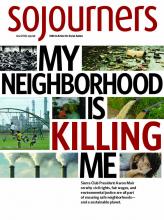IN DECEMBER 2007, Naomi Mwangi, a Christian, fled her home in Kisumu, Kenya, as men with machetes attacked towns across the region. For five weeks violence raged nationwide. When the bloodshed ended, more than 1,300 Kenyans were dead and another 650,000 had been displaced. Mwangi and her family ended up living in the Maai Mahiu refugee camp, south of Nairobi. She was 12 years old.
Mwangi is coming of age in a society with ethnic violence in the background, extremist violence in the foreground, and massive economic inequality. Africa has the highest concentration of young people in the world and more than half of them are unemployed. Mwangi wanted something different—she wanted to work for peace.
Now 21, Mwangi is a leader in grassroots peacemaking campaigns that seek to end conflicts between the 42 ethnic groups in this majority-Christian country. The 2007 election violence pitted Christian against Christian, as ethnic ties trumped religious affiliation. Even now, during elections, Mwangi told Sojourners, “Leaders motivate youth to join in the political crisis ... to fight against another tribe.”
A major obstacle to social and economic stability among youth in Kenya is unequal distribution of government-issued identification cards. Kenyans need ID cards for everything from voting and university enrollment to obtaining grants for entrepreneurship programs. But historically, the ruling government doled them out as political favors, and they’ve often been denied to members of minority groups.
“There are plenty of applications at election time,” Mwangi said, explaining that the ID process is slowed down or delayed when it seems one ethnic group could tip the chances of a politician who represents a different group.
Read the Full Article

